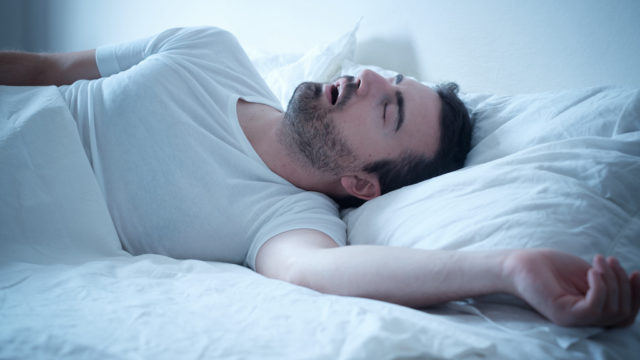Sleep apnea. The words sound scary and complicated, and there’s good reason to worry, because sleep apnea can impact your life in many ways. It helps to know more about the condition, what causes it, and how your dentist could help with the diagnosis and treatment.
What is Sleep Apnea?
Sleep apnea refers to a sleep disorder that causes people to stop and start breathing when they sleep. Though not all cases are severe, even moderate sleep apnea can be dangerous.
It’s estimated that about 25% of men and almost 10% of women have some form of sleep apnea. Most people have one of the three primary types of sleep apnea.
- Obstructive sleep apnea is the most common type, which involves the throat muscles relaxing during sleep.
- Central sleep apnea is caused by the brain failing to signal the muscles used to breathe while a person sleeps.
- Complex sleep apnea syndrome means that the person has both obstructive sleep apnea and central sleep apnea.
Signs and Symptoms of Sleep Apnea
Several conditions can trigger sleep apnea, and the truth is there’s still a lot we don’t know about it. For example, one study found ties between a large tongue and sleep apnea, however, that only explains a portion of obstructive sleep apnea cases. If you experience any of these common signs and symptoms of sleep apnea, speak to your medical team soon:
- Loud snoring
- Gasping for breath while you sleep
- Waking up every morning with a dry mouth
- Waking up with a headache
- Trouble staying asleep
- Daytime drowsiness and haziness, or difficulty paying attention
- Irritability
- Someone else noticing that you stop breathing during your sleep
Untreated sleep apnea could put you at serious risk, so it’s important to speak with your medical team if you suspect it could be a problem.
Can I Have Sleep Apnea and Not Snore?
One of the most common symptoms of sleep apnea is snoring. In fact, loud snoring and sleep apnea seem to go hand in hand. However, you can snore like a chainsaw and not have sleep apnea, but you can also rarely snore and have it.
Can Blocked Sinuses Cause Sleep Apnea?
If you have ever dealt with sinusitis, you know how difficult it is to breathe, especially when you’re laying down. Chronic sinusitis can cause sleep apnea and should be treated first to attempt to resolve both issues.
Can Sleep Apnea Cause Dental Problems?
There is a connection between dental problems, mouth breathing and sleep apnea. Mouth breathing during sleep causes dry mouth, which can lead to plaque buildup, oral sores, gum disease, and even trigger sleep apnea.
Sleep Apnea Diagnosis: The Role of the Dentist
Your dentist may be the first person to notice signs of sleep apnea. Given the correlations between a large tongue and sleep apnea, and even some abnormalities of the soft palate causing sleep apnea, it’s not difficult to see how dentists could identify the condition.
Dentists can identify structural issues, like a large tongue or jaw issues that could cause obstructive sleep apnea. Your dentist may also play a large role in treatment.
Can a Dentist Diagnose Sleep Apnea?
Sleep apnea is a complex condition that requires input from multiple medical professionals. Depending on the type, your dentist could play a vital role in diagnosing sleep apnea, but only an accredited sleep center can diagnose the condition.
Treatment of Sleep Apnea
Knowing how to prevent sleep apnea would be your best bet, but it’s not always possible to remove every potential risk factor. You may need to try more than one treatment to effectively manage your sleep apnea.
Lifestyle Changes
Depending on the cause of your sleep apnea, lifestyle changes could resolve your symptoms. Some changes you can make include:
- Lose excess weight
- Limit use of alcohol and other sedatives that could cause you to relax too much
- Stop smoking
- Treat nasal congestion
- Manage medical conditions as instructed, especially high blood pressure and Type 2 Diabetes
Dental Devices and Appliances
There isn’t a quick dental procedure for sleep apnea, but your dentist can still help. Dental treatment for sleep apnea can involve oral appliances to keep your airway in an optimal position. These may move the jaw forward or prevent your tongue from blocking your airway.
Positive Airway Pressure Devices
These machines, commonly referred to as a CPAP, can treat obstructive sleep apnea. They involve wearing a mask connected to a device that forces air through your airway to prevent it from collapsing while you sleep.
Surgery
Some people can just remove large tonsils and sleep apnea goes away, but that’s only one type of surgery used to treat the condition. If nothing else works to manage your sleep apnea, your medical team may suggest surgery to correct physiological abnormalities or even use radiofrequency to open your airway.
Can your dentist help with sleep apnea? Absolutely! If you suspect you have an oral issue related to sleep apnea, the team at Jefferson Dental & Orthodontics can help.




